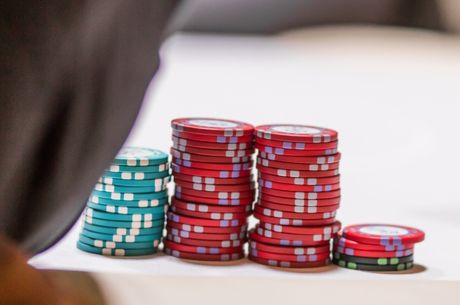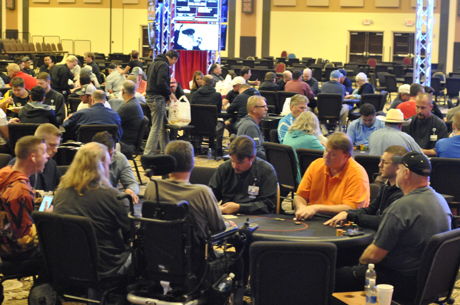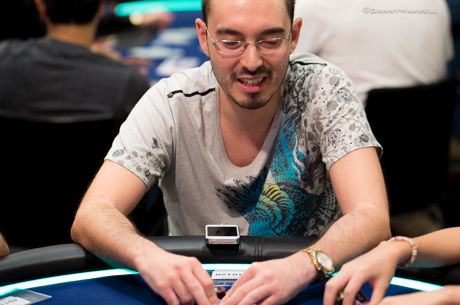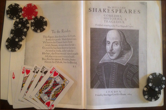Mountains, Swinging Bridges, and Fear of Loss in Poker
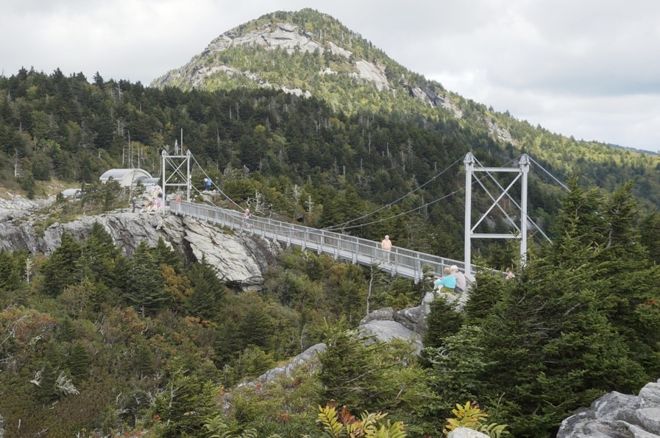
Last week my girlfriend and I went to Grandfather Mountain, part of the Blue Ridge mountain chain in western North Carolina. It's not the tallest of the bunch, but it has amazing views in every direction.
To get to the best vantage points, you have to walk across Swinging Bridge. Up above is a photo I took of it. Though the picture shows you the basic appearance of the bridge, it doesn't convey the depth of the gorge over which you're walking. It's a long way down.
I have mild acrophobia �� fear of heights. It's not paralyzing, and it rarely keeps me from doing anything I'd otherwise want to do, but it does make me seriously uneasy in some situations that are objectively safe. This was one of them.
Lots of other people were stopping halfway across the bridge to enjoy the beautiful views. I glanced over the edge once, just so I could say I didn't miss it entirely, but really the only way I could get across was by fixing my gaze at the walkway just ahead of my feet, and forcing myself to keep moving.
Once on the broad peak on the far side, I had a similar problem. I couldn't appreciate the best views that many others were getting because I was so disturbed by the feeling of exposure and vulnerability. I felt unsteady on my feet, as if a gust of wind or one wrong step or an accidental brush from a passing stranger might cause me to fall off the mountain. Even though I was nowhere near any edge where that could even be a possibility, I could stand up only briefly, feeling much more secure sitting or crouching for the added sense of stability.
In reality, though, I was never in any meaningful danger. The bridge has been there for decades without collapsing and without anybody falling off, and millions of people have stood on the peak to which it led without plummeting to their deaths. I knew these things, but that knowledge wasn't enough to keep my fears from nagging at me every second.
I pride myself on having a rational brain that is firmly in command of my primitive, irrational, emotional impulses. And I suppose it partially was, because it was only self-talk from that rational side that allowed me to cross the bridge and take in the views from the peak at all. Fully yielding to my instincts would have meant staying in the parking lot and visitors' center.
Of course, a fear of heights is a survival mechanism, encoded deep in our ancient DNA. Those who had too little of it tended to venture where it wasn't safe, and die before reproducing. But those who had too much wouldn't explore their whole environments, and would thus miss out on chances to find shelter, or hunt and gather food that the more adventurous could get.
The Fear of Loss, and "Loss Aversion"
Now, why would I spend 500 words talking about fear of heights in a poker column? It's because we have other built-in fears for which acrophobia is a useful point of comparison.
In particular, we all have a deep-seated fear of loss of resources. We feel more pain from a loss than we feel pleasure from an equivalent gain.
Here's how it's explained by Nobel Prize-winning economist Daniel Kahneman in Thinking, Fast and Slow �� a great book that you should definitely read if you want to understand how we humans make decisions:
For most people, the fear of losing $100 is more intense than the hope of gaining $150. We concluded from many such observations that 'losses loom larger than gains' and that people are loss averse.
You can measure the extent of your aversion to losses by asking yourself a question: What is the smallest gain that I need to balance an equal chance to lose $100? For many people the answer is about $200, twice as much as the loss. The 'loss aversion ratio' has been estimated in several experiments and is usually in the range of 1.5 to 2.5. This is an average, of course; some people are much more loss averse than others.
It's great in poker when you have a 50-50 chance of either losing $100 or winning two, three, or four times that much. Even the rankest amateurs are comfortable with such gambles.
But those opportunities are rare. We're much more often faced with decisions that are more comparable to flipping a coin for $110 in possible gain versus $100 in possible loss, or taking a 55-45 edge with even money on both sides. Your long term poker prospects depend on correctly making those much more difficult decisions on a consistent basis. The more experience you have with gambling generally, and with the mathematics of gambling specifically, the more willing you tend to be to take such small edges.
Kahneman explains how "Professional risk takers in the financial markets are more tolerant of losses, probably because they do not respond emotionally to every fluctuation." He goes on to describe participants in an experiment being told to "think like a trader," after which "they became less loss averse and their emotional reaction to losses (measured by a physiological index of emotional arousal) was sharply reduced."
The fear of loss, in other words, can be reduced with experience �� just as I could probably learn to relax and enjoy the views from that bridge and the peak to which it leads, rather than having to fight to suppress my instinctive fears, if I traversed it every day for a few weeks or months.
But we're unlikely to overcome our loss aversion completely. Like the fear of heights, it has been bred into us by powerful biological forces.
"This asymmetry between the power of positive and negative expectations or experiences has an evolutionary history," Kahneman explains. "Organisms that treat threats as more urgent than opportunities have a better chance to survive and reproduce."
It Hurts More to Lose Than It Feels Good to Win
Consider a real-world situation. You're at the end of a cash game session. You've been successful, turning a $300 buy-in into about $1,000. On what you have decided will be your last hand, you are dealt A?A?.
If I'm honest, here's roughly the thoughts that would run through my brain:
"Oh, for cripe sakes �� why now? With aces, as the saying goes, I'll probably either win a small pot or lose a big one. I sure don't want to lose a big pot now, and I don't care much about winning a small one. Maybe I should just throw it away, leave, and lock up my nice profit."
The worst thing you could do would be to play the hand cautiously, passively, trying to lose as little as possible. Though I can't prove it mathematically, I'm confident that that approach has a negative expected value, whereas the expected value (EV) of folding is just zero.
Obviously, the most positive EV decision would be to play the hand aggressively, the same way you would have an hour ago, when you had no immediate plan to leave. Objectively, nothing material has changed since then. Aces are the most strongly positive EV hand you can be dealt, so of course you should play them. And I would, despite my knee-jerk misgivings. I've played poker long enough to have absorbed pretty deeply the desirability of seeking EV over emotional comfort.
But I fully understand how the rational decision-making process can be derailed by the natural drive to loss aversion, and I freely confess to still falling victim to it from time to time.
And you know what? If you find yourself in a situation in which you just can't pull the trigger on the mathematically optimal, EV-maximizing decision because of the emotional power of loss aversion, it's okay. Really, it is. Don't beat yourself up over it. I absolve you. I absolve you for being human rather than a poker-playing bot.
Over time, though, if you want to get better at poker and increase your average hourly win rate, you have to learn how to handle such decisions. In theory, if you're offered the poker equivalent of a coin flip for a $101 win or a $100 loss, you should take it in a heartbeat, every time it's offered to you. But it takes a long time to whittle that inbred loss-aversion ratio from the 1.5-2.5 that we seem to be born with down to the 1.01 that it would take to accept that wager.
Conclusion
Don't kick yourself for the times that you can't quite pull the trigger on a correct but razor-thin call or value bet �� the times when your fear wins out over your rational decision-making. Those instances just mean that you have a normal, healthy, evolutionarily driven loss-aversion mechanism, and that you need more work on getting it to submit to your higher decision-making processes, as the latter become more finely honed with poker experience.
But do work on it, because the views from the other side are really spectacular.
Robert Woolley lives in Asheville, NC. He spent several years in Las Vegas and chronicled his life in poker on the "Poker Grump" blog.

